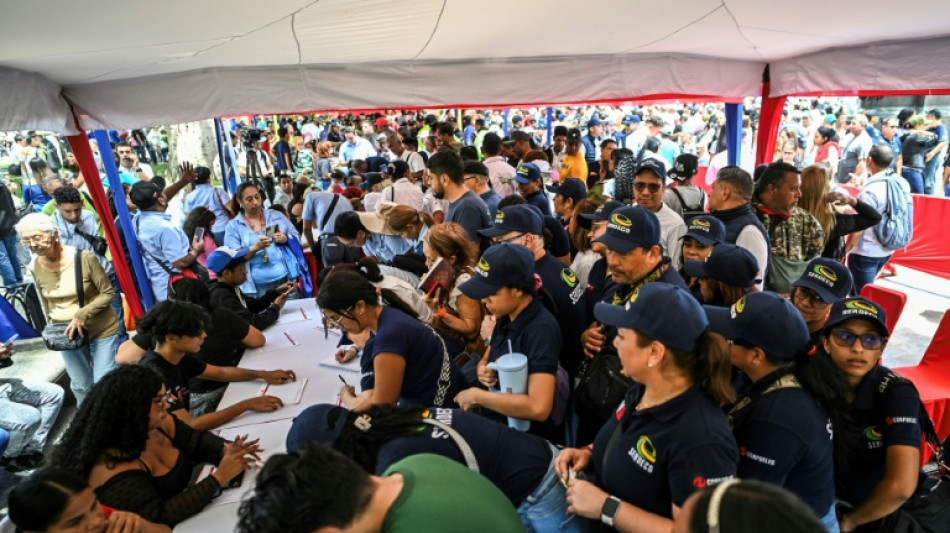

Venezuela rallies militia volunteers in response to US 'threat'
Civil servants, housewives and retirees alike lined up in Venezuela's capital Caracas on Saturday as thousands volunteered to join the country's militia in case there is a US invasion.
President Nicolas Maduro called on citizens to respond to the current US "threat" and sign up over the weekend to the Bolivarian Militia, a civilian corps linked to the South American country's armed forces.
The show of force is also intended to send a message to Washington, which has issued a $50 million bounty for Maduro -- who is accused by the Trump administration of leading a drug cartel -- and has stationed three warships off Venezuela's coast for what the US says are anti-drug operations.
Militia registration centers were set up in the capital's squares, military and public buildings and even in the presidential palace Miraflores.
Volunteers could also sign up in the Mountain Barracks, which is home to the mausoleum of late socialist leader Hugo Chavez, in a densely populated area with large housing projects and crumbling brick houses.
"Have you previously served?" a militia member dressed in camouflage asked Oscar Matheus.
"I'm here to serve our country," the 66-year-old auditor told AFP. "We don't know what might happen, but we must prepare and keep resisting.
"The homeland is calling us. Our country needs us," said 51-year-old Rosy Paravabith.
- 'Long live the homeland!' -
Dubbed the Bolivarian Army by Chavez, the Venezuelan Armed Forces do not hide the militia's political bent.
"Chavez lives!" is now their official greeting.
Former Venezuelan socialist president Chavez came to power in 1999 and died in office in 2013. Maduro has been in power since, though the US does not recognize the validity of his last two elections.
It is unclear how many troops are in the Venezuelan militia.
Maduro said this week that the militia alone has more than 4.5 million ready soldiers.
However the most recent independent estimate tallied about 343,000 members in 2020, according to the International Institute for Strategic Studies.
"I sign up for Venezuela, long live the homeland!" shouted the volunteers upon registration.
Police officers and military reservists also lined up to reaffirm their commitments.
After registering, volunteers were shown a documentary about the European blockade on Venezuela's coast between 1902 and 1903, after then-president Cipriano Castro refused to pay a foreign debt.
The 2017 film showed armed farmers, some shooting guns while others analyzed maps, as warships loomed in the distance.
Next, the volunteers were taken through a room with weapons on display: a US-made machine gun, a Swedish grenade launcher, a Soviet RPG launcher and a Belgian machine gun.
An army lieutenant explained how to use each weapon.
"Can this be shot at the sky?" an attendee asked.
"It's better to shoot it straight," the soldier replied.
- 'Immoral, criminal, illegal' -
The United States has sent armed forces to the Caribbean in the past.
But this time, the deployment coincides with US President Donald Trump's administration increasing pressure on Maduro by doubling its bounty on him to $50 million earlier this month.
The US alleges Maduro is leading the Cartel of the Suns, a drug trafficking group that has been designated a terrorist organization.
On Friday, Maduro described the US moves as an "illegal" attempt at regime change.
"What they're threatening to do against Venezuela -- regime change, a military terrorist attack -- is immoral, criminal and illegal," Maduro said.
On the streets of Venezuela, the topic prompted jokes and worries alike, though experts say it is unlikely the US would take direct action.
Maduro's opposition has called for people not to enlist -- though many were anyway.
"I know that because of my age I'm not going to carry a rifle," 78-year-old Omaira Hernandez said.
"But I'm willing to help them."
G.Lombardi--MJ




